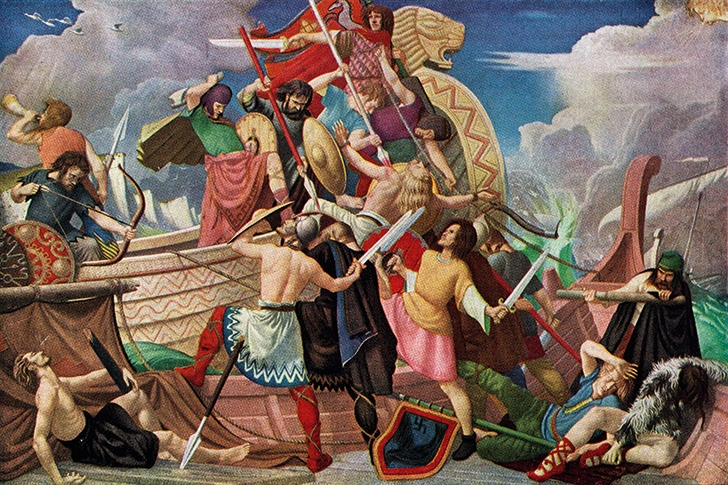Iam a teacher in a state secondary school in west London where the ethnic diversity of the pupils is remarkable. My current Year 9 class, for example, includes pupils with parents from Trinidad, Ireland, Turkey, French Guina, Algeria, Yemen, Italy, France, Bosnia, Albania, India, Germany, Iceland, Portugal, Zanzibar, Lebanon, America, and Spain. Over the past few decades, this ethnic diversity has been used as an argument against the teaching of national history. ‘What relevance do Boudicca and Benjamin Disraeli have to multi-ethnic pupils in modern Britain?’ it is asked. Well, quite a lot, I answer.
So far this year, those Year 9 pupils have learnt about the birth of the British empire, the slave trade and its abolition, the American War of Independence, and Britain’s industrial revolution. When I taught the same class in Year 7, they studied an almost exclusively English curriculum, from the Anglo-Saxons to the Wars of the Roses. Until recently, it would have been difficult to get away with teaching such an anglocentric school history curriculum. Labour’s 2007 national curriculum was chock full of the language of ‘diversity’. History, it said, should prepare pupils ‘for life in a diverse and multi-ethnic society and in an increasingly interdependent world’. But it seems as if the political class has woken up to the dangers of neglecting the bonds of nationhood. When in 2011 David Cameron stated that ‘state multiculturalism has failed’, he wasn’t criticising the existence of different ethnic groups in British society. He was criticising the idea that ethnic groups should be allowed to exist within their own distinct culture with no encouragement to integrate into mainstream British society. I would argue that if any institutions have the power to foster such integration, it is schools. And if any subject within the school curriculum can lead the way, it is history.
This view seems to be shared by a report into opportunity and integration published by the Department for Communities and Local Government in December 2016. One of its views was that ‘The promotion of British laws, history and values within the core curriculum in all schools would help build integration, tolerance, citizenship and resilience in our children.’
This is what the history curriculum at the school I teach at — the West London Free School — seeks to achieve. It would be impossible to tailor the curriculum to the ethnic backgrounds of all pupils; we would have to jump from black history to João I of Portugal, via Brian Boru, Shah Jahan and the Ottoman empire. Instead, I teach to the common ground that unites all of the pupils sitting in front of me: British citizenship.
It is often assumed that teaching national history is inherently nationalistic, but why? None of my pupils leave my lessons believing British history deserves only praise. We study British history warts and all, including Cromwell in Ireland, the transatlantic slave trade and Boer War concentration camps. I do not want my pupils to celebrate British history, nor to bemoan it. I simply want them to know about it.

Just as you can never truly understand a person until you know about their past, you can never truly understand a country through its appearance today. When my pupils cross the Thames, I don’t want them to see ‘just’ a river. I want them to see the place where King John signed the Magna Carta, where James II discarded the Great Seal of the Realm, and where the Great Stink prompted Parliament to clean up Victorian London. In our little patch of west London, my pupils are likely to encounter Nell Gwynn House, the Churchill Arms pub and Hogarth Roundabout. I want these names to have meaning for them.
While I don’t believe that the teaching of British history should be solely celebratory, I do think it should give pupils a better appreciation of the values that underlie British society: tolerance, personal freedom, democracy, stability, and the rule of law. These achievements have not simply occurred overnight. They were hard won. Religious tolerance emerged in Britain out of centuries of conflict, from the Elizabethan religious settlement to Catholic emancipation. Our parliamentary system emerged out of the war, bloodshed and revolution of the 17th century. We have the long struggles and suffering of Chartists, suffragettes and trade unions to thank for equal voting rights.
For years, adherents to the ideology of multiculturalism argued that the story of Britain’s past had little relevance to ethnically diverse pupils in today’s schools. But such pupils are living in its legacy. As inhabitants of Britain, this is a story they can, and should, make their own. So many celebrated custodians of Britain’s past have been of immigrant stock. The great Tudor historian Geoffrey Elton was born in Germany and brought up in Czechoslovakia (his nephew Ben Elton wrote Blackadder). Simon Schama was born to parents of Turkish, Romanian and Lithuanian origin. The bard of Britain’s Victorian railways, Michael Portillo, is the son of an exiled Spanish republican.
I would be delighted if one of the pupils I teach went on to be an Elton or Schama of tomorrow. But I am content to set my ambitions a little lower, and equip each pupil with an understanding of the country they live in. Such knowledge is precious. My responsibility as their history teacher is, in the words of Hector from The History Boys, to ‘pass it on’.






Comments